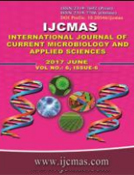


 National Academy of Agricultural Sciences (NAAS)
National Academy of Agricultural Sciences (NAAS)

|
PRINT ISSN : 2319-7692
Online ISSN : 2319-7706 Issues : 12 per year Publisher : Excellent Publishers Email : editorijcmas@gmail.com / submit@ijcmas.com Editor-in-chief: Dr.M.Prakash Index Copernicus ICV 2018: 95.39 NAAS RATING 2020: 5.38 |
Thirty CGMS-based pigeonpea [Cajanus cajan (L.) Millspaugh] hybrids were synthesized by crossing six CMS lines with five ‘R’ lines and evaluated to study yield potential with the performance of their R-lines. Result indicated that the male sterile lines exhibited 100 per cent pollen sterility and R- line acts as good restorer and pollen fertility varied from 98 to 100 per cent. All crosses exhibited pollen fertility ranged from 92 to 100 per cent. Most of the hybrids showed standard heterosis in desired direction for yield and its contributing traits with high fertility restoration. The range of standard heterosis over GTH 1 for seed yield per plant was from -27.29 (CMS GT 301 A x GTR 52) to 69.79 per cent (CMS GT 603 A x GTR 52). The best cross combinations for seed yield were CMS GT 603 A X GTR 52 (69.79 %), CMS GT 603 A X GTR 23 (64.59 %), CMS GT 288 A X GTR 95 (57.22 %) and CMS GT 603 A X GTR 95 (53.76 %), CMS GT 601 A X GTR 95 (49.41 %), CMS GT 33 A X GTR 18 (47.69 %), CMS GT 603 A X GTR 8 (46.81 %), CMS GT 601 A X GTR 52 (37.30 %),CMS GT 302 A X GTR 8(33.39 %) and CMS GT 301 A X GTR 95 (28.61 %). These hybrids had high per se performance for grain yield, more standard heterosis with one or more its contributing traits viz. number of pods per plant, biological yield, leaf area and harvest index and having high pollen fertility status suggested that these hybrids can be directly exploited commercially after evaluating their performance in wide range of environment. These crosses can also be used to throw-off transgressive segregants for the improvement of yield and its attributing traits.
 |
 |
 |
 |
 |